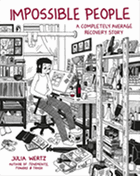
 Cartoonist Julia Wertz (Drinking at the Movies) makes comics that defy expectations, and with Impossible People, she offers a graphic memoir that tackles addiction, but with none of the expected dramatic highs and lows. The book opens boldly with a single panel depicting Wertz stranded after crashing a rental car in Puerto Rico and the simple phrase: "What the fuck." As the narrative flashes back to four years earlier, readers might assume they know what's going on--a drunk Wertz crashes her car, and realizes she has a problem. But in the comic, as in life, it's not that simple.
Cartoonist Julia Wertz (Drinking at the Movies) makes comics that defy expectations, and with Impossible People, she offers a graphic memoir that tackles addiction, but with none of the expected dramatic highs and lows. The book opens boldly with a single panel depicting Wertz stranded after crashing a rental car in Puerto Rico and the simple phrase: "What the fuck." As the narrative flashes back to four years earlier, readers might assume they know what's going on--a drunk Wertz crashes her car, and realizes she has a problem. But in the comic, as in life, it's not that simple.
The flashback rewinds to a doctor's visit where 26-year-old Wertz admits to drinking two bottles of wine a night and the doctor replies, "You need to quit drinking so you're not dead by 30." For some, that would be the dramatic low they need to take steps toward sobriety, but the path is not always so linear. Moving through the next four years, Wertz perfectly captures the oscillation between wanting to quit drinking and being unable to, a dance familiar to many who struggle with addiction. She knows she has a problem, but she's not as bad as her brother, who regularly overdoses before seeking treatment and getting sober. By contrast, she has a quiet and dull life, even if it is one dominated by a need to drink to the point of blacking out every night.
Despite these difficult elements, Impossible People is decidedly funny. Conversations with her brother (now clean) punctuate the book and are simultaneously encouraging and hilarious. So are Wertz's attempts to date or simply interact with other humans (her brother asks, "Why are you hiding inside your clothes?" when she awkwardly tries to make herself attractive to a stranger at the airport). The book is also uncommonly beautiful. Wertz proved her skill at architectural drawing in Tenements, Towers & Trash, and here she uses meticulously observed and finely crafted city scenes as a backdrop to her story. The contrast between the deceptively simple panels focused on dialogue or relationships and the heavily detailed storefronts and streetscapes is incredibly effective, helping readers to see, as Wertz does, the beauty of "little scenes of everyday life."
Calling her story "completely average," Wertz has created a book that will speak to readers universally, regardless of their relationship with alcoholism and sobriety. But for those who have experience with addiction and recovery, this book is a remarkable act of generosity and community that could actually save lives. --Sara Beth West, freelance reviewer and librarian
Shelf Talker: Impossible People's humor and honesty will appeal to readers universally, but for those in addiction and recovery circles, it is an act of generosity that might actually save lives.

